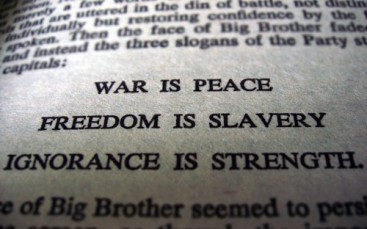
Over the last few weeks, I asked some hard questions I thought we should all ask Romney, Ryan and the Republicans. I did the same with Obama and the Democrats.
Because the so-called mainstream media is not asking them, I thought the onus is on us.
Even though it’s an American election where U.S. citizens vote to elect their president this November, actually it’s an election that has serious impact for the entire world. In a way, it’s a global election. Therefore, politically enlightened people from all over the world need to understand the various aspects of the election as clearly as possible. For the entire world, the stake is too high.
I was happy to see the level of reaction to my posts. A surprisingly high number of readers of this blog — now from near and far corners of the world — read the questions I asked to the Democratic and Republican candidates. Some wrote their comments directly on the blog, and some others sent me their feedback personally. Some of these friends had a strong disagreement with my position on Obama; they were also unhappy to see how a super-excited 2008 me turned into a less than enthusiastic 2012 me. These friends challenged my political acumen when I asked some critical questions to the Obama campaign. When I said I was not feeling excited at all for Obama, they warned me not to pop their excitement balloon. They said my wet blanket to douse their party bonfire might hurt Obama’s chances.
I felt delighted — by the thought that my little, no-name blog had so much power!
Of course, this is almost an academic discussion. Neither Romney nor Obama is going to read my blog, let alone answer my questions. But this is all I can do. I have said it many times before: other than my writing that I use to make my readers, friends and sympathizers think, I have no power. I have no money, no pedigree, no political connection and no real hope for publishing my thoughts for a wide mainstream audience. Therefore, this is really the extent of my political activism. This is the best use of my experience, analysis and energy.

I try to make people think. I try to challenge their minds. This is my only non-violent weapon.
Now, for the sake of time, let’s select only a few issues that are critically important both for an U.S. and global audiences. Food, clothes and shelter: these three have always, historically, been the most primary for the ordinary people across the world. In today’s globally-connected society, some other issues have become critical: I could perhaps select war and violence, energy, environment, education and health for the list. Then, we could perhaps include the subject of labor, immigration and society. I’m sure you quickly see a few other issues that you would want to include in your first list. I am sure I myself would later reflect on it and include a few more that I might have missed this time around.
But at least for the time being, not to make this post unnecessarily long, let’s put together our first list of issues and compare the two big parties and their two big candidates on these issues. It might help us to understand the nature of the electioneering process as it is heating up here in the U.S., and determine objectively what exactly is going on. Often, these critical issues do not surface our way — the ordinary, powerless people’s way — in the 24/7 conversation on big media done by their big experts. I call it Journalism of Exclusion.
Therefore, again, the onus is on us to do it. We must do it. Questioning is democracy. Analyzing is too.
So far, we have identified the following issues to be critical to compare the positions of Obama and Romney and their two big parties.
(1) Food
(2) Clothes
(3) Shelter
(4) War and violence
(5) Energy
(6) Environment
(7) Education
(8) Health
(9) Labor
(10) Immigration
(11) Society
Of course, the all-encompassing, all-pervasive, overarching factor would be economics and money. Given its overlapping nature, I decided not to itemize economics as a separate point. The discussion of money would feature quite prominently when we take up these points — one point at a time. Foreign policy would be another such aspect: it’s going to be interwoven in the discussion of all the other points — one way or the other. And obviously, jobs, wages and unemployment would be another — if not the most important — all-pervasive subject. It brings us to the question of poverty, exploitation and injustice.

But in this intricately-connected world society of the new millennium, where political boundaries have become almost meaningless, especially when we consider how economics and money (and work) can move from one part of the globe to the opposite part — with a speed of light, and considering how the people in power are using the global connectedness to their advantage, I believe that perhaps we could add one more item on our list. And that item would be:
(12) Globalization.
There! I believe we have come up with a good list, at least for the time being. Now let’s see if we can briefly discuss and compare the positions of the two candidates and their parties on these issues. I’ll try to do it as simply as possible, without making it sound too academic. I’ll try to do it with a language most of us — including myself — would understand. You tell me, please, if this language works for you.
If we think carefully, there is practically no way we can discuss one of the above twelve topics exclusively: they are all overlapping. What role does food and water play in today’s politics? Food prices, food quality, water sources, water quality — and the politics of U.S. government and its two big parties — one that media hardly talks about? Coca Cola’s capturing of natural water displacing millions of poor people from their land (and putting a famous movie celebrity as their PR)? U.S. seed company Monsanto’s forced replacement of Indian farmers’ traditional seed banks with their one-crop, genetically engineered seeds forcing those farmers to go bankrupt and commit suicides in hundreds of thousands every year? McDonald’s food colonization with substandard, unhygienic food that caused obesity and serious harmful effects in the U.S. and throughout the world?
What about the foreign policy around the clothes we wear — where and how are they made? How many of us know how Wal-Mart manufactures its imported textiles from China and Bangladesh, Disney manufactures its fancy DisneyWorld costumes from Haiti or Dominican Republic, driving poor laborers like slaves and depriving child workers of their childhood and education? What about those cool i-Phones manufactured at China’s Foxconn where a large number of desperate, young Chinese workers have killed themselves — because of the horrendously oppressive work conditions and toxic environment?
Where is the discussion either at the huge, confetti-covered RNC or DNC? Is there going to be any discussion at the presidential debates? Will New York Times, NPR, PBS or CNN talk about them between now and November?

Now, let’s see. war and violence are two subjects where the two parties’ positions are different, they say. Okay, it is true that Romney, Ryan and Rush Limbaugh’s Republican Party openly talk about a new, imminent war on Iran (or Syria, or Yemen…it doesn’t matter); on the other hand, Obama and Hillary Clinton talk about how they have finished the Iraq war and how they’re going to withdraw from Afghanistan in two years. And then of course comes Joe Biden and gives a war-drumbeat speech at DNC…as if John McCain or Joe Lieberman (remember him?) was speaking. And there is rousing chants all around at the convention…USA…USA…USA…
But let’s see: was there any reason for U.S. to be in Iraq in the first place after six or seven years of destroying an ancient civilization, killing hundreds of thousands of people, and looting their oil, gold and other treasures? It’s almost like the British colony withdrawing from India after total plundering, brutalizing and partitioning a once-prosperous civilization, putting their handpicked, subservient, “Gandhian” feudals in power. The aggressors were going to leave sooner or later anyways: there was no more reason either for the British to stay in India or for the U.S. to stay in Iraq. Where is that perspective?
Can we talk about it in a straightforward way? Oh yes, can we also include the politics Israel has always played and has been playing in this incredible mess? Isn’t Iran or Syria or Egypt or Libya or Saudi cards used in the same game?
And then come Obama’s hit list and the drones and the relentless bombing…the war is over?
And then comes Julian Assange and Wikileaks and Bradley Manning…didn’t they say whistle blowing was actually patriotic?
Would New York Times, NPR, PBS or CNN talk about them? Would anyone throw these questions — this straightforward way — in the presidential debate?
We’ll now talk about globalization, immigration, labor and the economy — and their interconnectedness. We need to know how these two parties and their candidates are different on these issues.
I hope you come back to participate in that discussion. I need you in that discussion.
(To be continued…)
Sincerely Writing,
Partha
